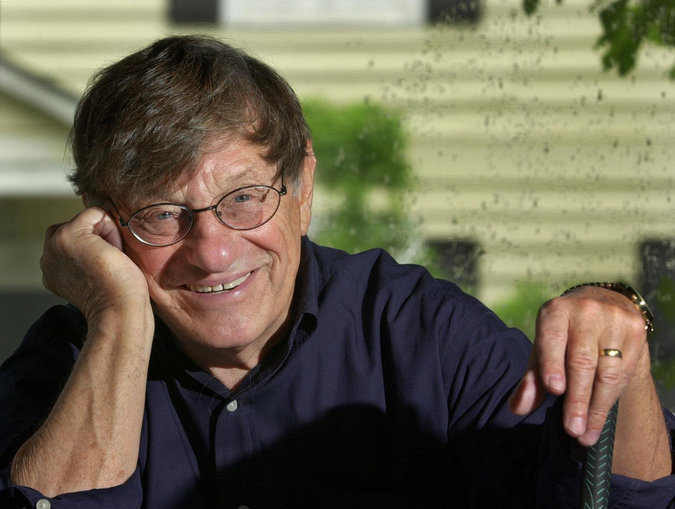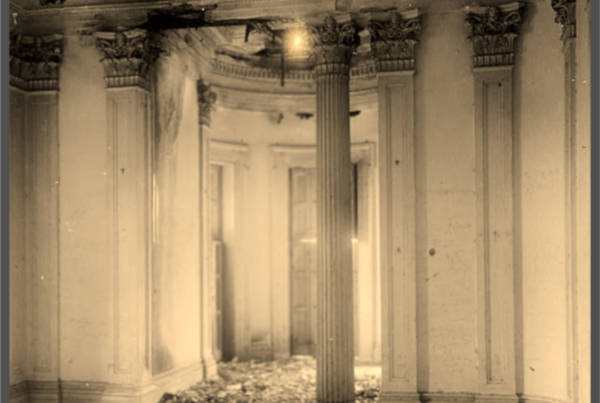From personal experience I can draw any number of anecdotes that would vividly personify William Price Fox, the South Carolina novelist, story writer, and chronicler of the South who died in April at age eighty-nine, a few days following his birthday, another vibrant person claimed by the scourge of Alzheimer’s.
This occurred in 1988. I hitched a ride with Bill to the Russell House on the campus of the University of South Carolina in Columbia. The Russell House was the center of student activity on campus, and that evening the ballroom was to play host to the annual awarding of literary prizes by the staff of Portfolio, then USC’s student literary journal. Bill, in haste, didn’t bother with the lines that clearly marked the parking spaces on Greene Street; he drove up onto the sidewalk itself, very nearly upending a parking meter. He shut off the engine and turned to me, sitting beside him in the passenger seat, flashing his wide-toothed grin.
“It’s okay,” he said. “I’ve got tenure.”
In another moment unlikely to leave memory, he recounted the time he was writing a story for Holiday magazine on the American circus and had followed an entourage for first hand material. Among other unusual personages he encountered during this mission were a set of pinheads, malformed creatures the likes of which the film director Todd Browning had made infamous in his horror classic Freaks. Bill said the pinheads amused themselves before, between, and after shows by taking cans of chocolate icing and spreading the stuff on their heads. Why I found that funny I’m not sure; but I did, and for the remainder of that class I sat in the painful situation of wanting to laugh out loud when laughter was no longer appropriate, hoping against hope someone, Bill or another student, would say something hilarious so that I could relieve myself.
Bill could produce that kind of laughter because he was a consummate storyteller, and he had an inexhaustible fund of vignettes and memories. He regaled us with stories of Roger Miller, the country performer and writer of such classics as “Dang Me” and “King of the Road” (“A genius,” Bill declared more than once), of working as a script doctor for The Beverly Hillbillies, whose principal performers, Buddy Ebsen and Irene Ryan, had to be filmed between bouts of heavy drinking, and his times as a salesman in New York City. I took a number of classes with Bill from 1985 through 1989, and I had heard some of those stories more than once, but no matter: they sounded as fresh the third or fourth time as they did the first. And I laughed just as hard, my ribs sore afterward.
Bill had energy. He was a shock of lighting that hit again and again and again. He was an engine that never lost fuel. He entered a classroom with a jazzy stride that bespoke of so much to do in so little time. He moved his large bronzed hands constantly to make some point about a student’s story or the work of a favored author (many of us owe our reading of One Hundred Years of Solitude to Bill). Energy was very important to him – that drive that accomplishes a novel or a story or a piece of journalism. “You’re not working till you’re working,” he once told a group of students for an ETV taping of The Writer’s Workshop, a marvelous series of world-class authors discussing their craft and careers produced right there on the Columbia campus in the early 1980’s. (Fellow USC professor James Dickey was another interviewee, as were Tom Wolfe, William Styron, and Reynolds Price.) Like Flannery O’Connor, Bill was well aware that “creative writing,” and the college courses devoted to it, often draws an inordinate number of shiftless people who do not want to do the work necessary to get something of value down on the page. He excoriated students obsessed with writing about nothing but their feelings, which were, of course, the same feelings everyone else their age experienced. There had to be a story, and the story had to feature a central character who wanted something – a woman, a job, a glass of water – else the reader won’t give a hoot and the story will fail. There had to be specific detail buffeting up that character and his or her surroundings and bringing them to life. And Bill had wide-ranging life experience in which to mine for these precious “specifics.” His novelistic work constitutes a veritable autobiography – coming of age in post-World War II Columbia, South Carolina, in Moonshine Light, Moonshine Bright (1967); the country music scene in Ruby Red (1971); the hustle and bustle of NY sales in Dixiana Moon (1981); the life of an air force pilot in The Wild Blue Yonder (2002). This works come alive through Bill’s mastery of the specific – the right detail and the right amount of it. The same can be said for his non-fiction corpus: his account of Hurricane Hugo in The Lunatic Wind (1992), his chronicling of the demise of the American drive-in movie, his verbal portrait gallery of various Southern personages, high and low, to be found in his magazine articles (for The Atlantic, The Saturday Evening Post, and others) and in his book Chitlin’ Strut and Other Madrigals (1983). The New York Times, in its obituary for Bill, even reprinted Bill’s rather sanguine explanation for what a “chitlin’” is word for word:
The chitlin, a long tubelike affair is stretched out and scraped down, then turned inside out and scraped again. Three lengths are braided together, boiled until tender, then battered, deep-fried and served. And who will eat a chitlin? Max Gergel, a Columbia sage I travel with and who is famous for promoting the now-defunct insecticide “Sam Chewning’s Roach’s Last Supper” (featuring a four-color label of 12 roaches chowing down at the da Vinci table) explained: ‘You take a man and tie him to a stake and feed him bread and water and nothing else for seven days and seven nights, and then he will eat a chitlin.’ Max, who can stretch and roll a sentence out until it sounds like it was lifted from Ecclesiastes, paused carefully. “He won’t like it, but he will eat it.”
Only a writer immersed deeply in Southern folkways could produce such a paragraph.
My own preference is for the short stories. There the characters and conflict are compact, but they still retain the same telling detail as the novels. Among the better known titles are “Pit Fight,” “Razor Fight at the St. Louis Café,” and “Have You Ever Rode the Southern?” But I have especial fondness for the title story of his lone short fiction collection, Southern Fried Plus Six. Again Bill draws off his life experience for this piece, his time working at a drive-in restaurant in Columbia, and the details show:
The French fry pots were bubbling white as the fresh-cut potatoes and breaded chicken were scalded and fried at 380 degrees. The grease was so thick in the air you could write your name on the refrigerator door thirty feet away from the grill and fry pots, and the fat at the back of the grill flowed through the grill drain like water. The duckboards were beginning to get slippery. Flour and cracker mill from the chicken batter rose in the heavy, grease-filled air and my hands and arms were white with flour and stick with eggs.
That’s a passage worthy not only of a first-rate Southern prose stylist but of Joyce and Flaubert as well. And Balzac too. Like that French master, Bill felt it imperative that a writer make his story come alive on the page, be vibrant, pungent, and tangible.
Although a Full Professor of English at the University of South Carolina, Bill Fox did not fit into the mode or image of the typical academic. For one thing he wrote stories that people could read with pleasure and not theoretical explorations of minutiae in the novels of some author no one had ever heard of, much less read. He was quite wary of that kind of writing and once told his students, “That stuff will screw you up. Stay away from it.” Bill’s political views fell generally along the liberal side of the spectrum. He took regular and frequent column space in Columbia publications such as Free Times to jab at the follies of the Bush administration, and he made an unfortunate foray into the debate over the flying of the Confederate flag, in which he called Shelby Foote, a flag supporter, a “second rate novelist and third rate historian.” (I feel more than sure he never even read Foote.) However, he could not be accused of political correctness. He never sought to be fashionable in his work or his private life and wasn’t afraid to say what he wanted to say to whomever, although his statements were generally issued without malice. This may in part account for his being ignored by the greater literary critical establishment. I can think of only one first-rate critic with a national reputation, the late and ever-generous George Garrett, who gave Bill’s work the consideration it deserved. In his book Southern Excursions, Garrett gives thoughtful consideration to Bill’s penultimate novel, Dixiana Moon, lauding the author’s complex characterizations, his “clear and vivid and witty style, the economy and graceful pace of his story, the sensuously realized surfaces of places and things, his refusal to settle for easy labels and cliches…his perfect-pitch ear for American speech of our times, his own irrepressible good humor and optimism, and, perhaps most of all, the pure fun of his invention.”
Garrett’s review is more than an occasion for praise of an excellent novel. It is a strong call to recognize a writer whose work mattered then, matters now, and will always matter as long as people cherish the art of storytelling.







